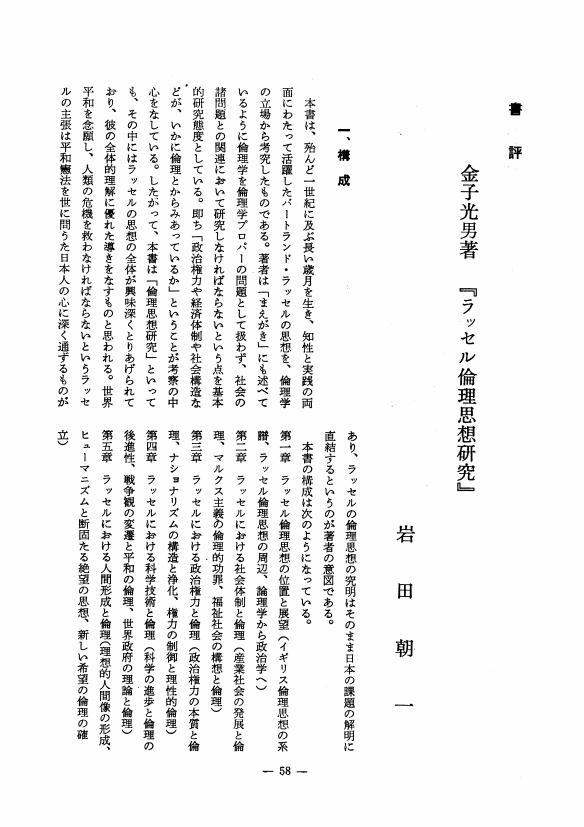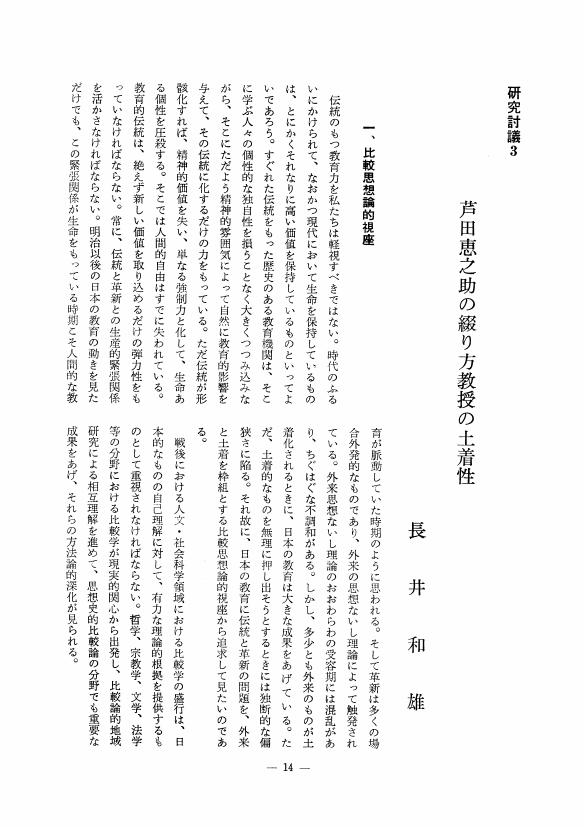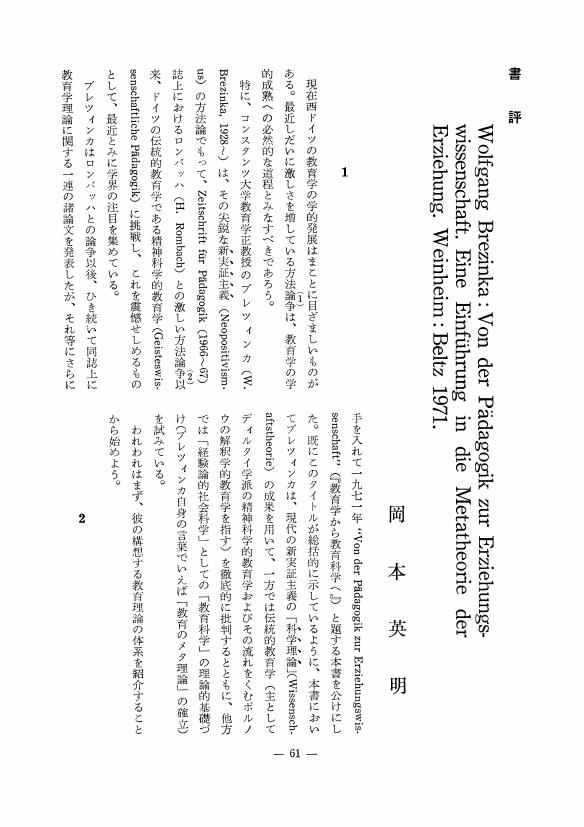1 0 0 0 OA 言語と教育
- 著者
- 勝部 真長
- 出版者
- 教育哲学会
- 雑誌
- 教育哲学研究 (ISSN:03873153)
- 巻号頁・発行日
- vol.1976, no.33, pp.33-41, 1976-05-10 (Released:2009-09-04)
1 0 0 0 OA 日本語と教育の問題 日本語の特質と教育の基本問題
- 著者
- 西脇 英逸
- 出版者
- 教育哲学会
- 雑誌
- 教育哲学研究 (ISSN:03873153)
- 巻号頁・発行日
- vol.1976, no.33, pp.25-32, 1976-05-10 (Released:2009-09-04)
1 0 0 0 OA 追悼のことば
- 著者
- 長谷川 亀太郎
- 出版者
- 教育哲学会
- 雑誌
- 教育哲学研究 (ISSN:03873153)
- 巻号頁・発行日
- vol.1976, no.33, pp.23-24, 1976-05-10 (Released:2009-09-04)
1 0 0 0 OA 故 稲富栄次郎博士略歴
- 著者
- 中森 善治
- 出版者
- 教育哲学会
- 雑誌
- 教育哲学研究 (ISSN:03873153)
- 巻号頁・発行日
- vol.1976, no.33, pp.15-22, 1976-05-10 (Released:2009-09-04)
1 0 0 0 OA アメリカ教育哲学の動向
- 著者
- 田浦 武雄
- 出版者
- 教育哲学会
- 雑誌
- 教育哲学研究 (ISSN:03873153)
- 巻号頁・発行日
- vol.1975, no.31, pp.68-73, 1975-05-20 (Released:2009-09-04)
- 参考文献数
- 6
私は、一九七四年九月五日から二ケ月間、文部省在外研究員として、アメリカ教育哲学の動向について、研究する機会をえた。アメリカには、十二年前に、ハーバード・エンチン研究所の招致研究員として、十ケ月程留学したことがあるので、今回は二度目のアメリカでの研究であった。今回は、ハーバード大学のイスラエル・シェフラー、コロンビア大学のP・H・フェニックス、ホノルルでセオドーア・ブラメルド等の各氏と会い、話しあいの機会をもち、あわせて資料蒐集をおこなうことを重点に、日程をくんだ。以下、アメリカ教育哲学の動向について、私の見聞を中心に報告したい。
1 0 0 0 OA ヤスパースの「教育論」について
- 著者
- 三浦 武人
- 出版者
- 教育哲学会
- 雑誌
- 教育哲学研究 (ISSN:03873153)
- 巻号頁・発行日
- vol.1975, no.31, pp.39-55, 1975-05-20 (Released:2009-09-04)
- 参考文献数
- 80
Jaspers interprets education in the true sense as a combination of transmission of tradition and the possibility of developing into a self-existence. He finds real substance in the tradition, substance in this context being understood as the nature of the spiritual world producing the spiritual foundations of man, i. e. the thought mode, the faith mode and the life mode. Accordingly, his educational theory can be expressed in other words thus, man is born within a thought mode, a faith mode and a life mode and becomes man by growing within these modes ; furthermore, he not merely assimilates these modes, but becomes a self-existence by examining them critically and by assimilating them in a selective process. Education is the activity of counsciously planning and realising this situation. The modern age is a time when substance desintigrates and when a skeptic eye is turned toward all modes of thought, faith and life. Hence, naturally, education too must fall into a state of confusion. We must search, therefore, after some way in which education in modern times can be restored. Answering this need Jaspers proposes a way of “taking consciously a fresh look at history to re-discover the basis of human existence.” He explores the possibility of restoring true education in the real transmission of the spiritual substance which existed in the past.
- 著者
- 大木 秀夫
- 出版者
- The Japanese Society for the Philosophy of Education
- 雑誌
- 教育哲学研究 (ISSN:03873153)
- 巻号頁・発行日
- vol.1975, no.31, pp.74-79, 1975-05-20 (Released:2009-09-04)
1 0 0 0 OA 社会化と人格化
- 著者
- デアボラフ J ルメール K
- 出版者
- 教育哲学会
- 雑誌
- 教育哲学研究 (ISSN:03873153)
- 巻号頁・発行日
- vol.1975, no.31, pp.56-67, 1975-05-20 (Released:2010-05-07)
1 0 0 0 OA デューイにおける教育理論の哲学的基礎 知識 (思考) の人間化をめぐって
- 著者
- 杵渕 俊夫
- 出版者
- 教育哲学会
- 雑誌
- 教育哲学研究 (ISSN:03873153)
- 巻号頁・発行日
- vol.1975, no.32, pp.19-35, 1975-10-10 (Released:2010-01-22)
- 参考文献数
- 83
The most fundamental characteristic of Dewey's educational theory is that all through it runs the theme of the restauration of the mutual close relationship between formal school education and social life, and that thus it endeavors to turn the school into an efficient organ for the intellectual formation and reconstruction of child experience. The aim of this paper is to examine more closely this problem consciousness in an attempt to arrive at a deeper understanding of the nature of Dewey's fundamental philosophic interest.
1 0 0 0 OA 芸術への道徳優先に関する小論考
- 著者
- 長谷川 亀太郎
- 出版者
- 教育哲学会
- 雑誌
- 教育哲学研究 (ISSN:03873153)
- 巻号頁・発行日
- vol.1975, no.31, pp.20-38, 1975-05-20 (Released:2009-09-04)
- 参考文献数
- 69
Ideally speaking, morality and art are very closely related to each other, have many aspects in common and ultimately form a harmonious unity. In reality, however, morality and art frequently face mutual opposition, conflict and clash. This is so because morality and art do not remain faithful to their original nature.The most desirable fundamental relation between morality and art is the standpoint where “art is promoted as far as possible while morality is protected as far as necessary” with the basic understanding of “the priority of morality over art”. To render such a standpoint possible, morality based on religion embraces art and softens it. This constitutes the effort leading toward the ultimate ideal of harmonising morality and art.
1 0 0 0 OA ボン大学教育学研究室
- 著者
- 小笠原 道雄
- 出版者
- 教育哲学会
- 雑誌
- 教育哲学研究 (ISSN:03873153)
- 巻号頁・発行日
- vol.1975, no.32, pp.50-55, 1975-10-10 (Released:2009-09-04)
1 0 0 0 OA 「教育哲学」のことば
- 著者
- 宇佐美 寛
- 出版者
- 教育哲学会
- 雑誌
- 教育哲学研究 (ISSN:03873153)
- 巻号頁・発行日
- vol.1975, no.32, pp.36-49, 1975-10-10 (Released:2009-09-04)
- 参考文献数
- 5
1 0 0 0 OA 一九二〇年代シュプランガーにおける文化教育学思想の特質
- 著者
- 新井 保幸
- 出版者
- 教育哲学会
- 雑誌
- 教育哲学研究 (ISSN:03873153)
- 巻号頁・発行日
- vol.1974, no.30, pp.30-45, 1974 (Released:2009-09-04)
- 参考文献数
- 25
This paper discusses the fundamental pedagogical theory (i. e. the cultural pedagogical thought) of Spranger in the twenties. The theory of cultural pedagogy combines through its copncet of culture the individual viewpoint with the social viewpoint and while contrasting the peculiar nature of education with cultural creativity, determines education as an act of cultural production, as such distinct from mere cultural transmission. In the central theme of the theory of cultural pedagogy formally fixed as mutual interaction of the subjective spirit and the objective spirit, building on the formation theory of neo-humanism, the theory of cultural pedagogy contains the characteristics of the formation theory. The theory of cultural pedagogy which amounts to a revival of the formation theory of neohumanism, while making much of the classical formation theory, carries, above all, at its centre the theme of the self-formation of modern man staying in close contact to the German classical school of thought. The theory of cultural pedagogy with these characteristic features took a critical stand against the debates concerning school reform which stood out clearly in contemporary Germany at that time, and at the same time it was critical also of the generation gap, yet at the same time this theory was occasioned by an attempt to mediate between these two opposites.
1 0 0 0 OA 最近における西ドイツ教育改革の動向 留学の報告にかえて
- 著者
- 天野 正治
- 出版者
- 教育哲学会
- 雑誌
- 教育哲学研究 (ISSN:03873153)
- 巻号頁・発行日
- vol.1974, no.30, pp.46-52, 1974 (Released:2009-09-04)
1 0 0 0 OA 西ドイツのヘルバルト研究
- 著者
- 中森 善治
- 出版者
- 教育哲学会
- 雑誌
- 教育哲学研究 (ISSN:03873153)
- 巻号頁・発行日
- vol.1974, no.30, pp.53-57, 1974 (Released:2009-09-04)
1 0 0 0 OA 金子光男著『ラッセル倫理思想研究』
- 著者
- 岩田 朝一
- 出版者
- 教育哲学会
- 雑誌
- 教育哲学研究 (ISSN:03873153)
- 巻号頁・発行日
- vol.1974, no.30, pp.58-62, 1974 (Released:2009-09-04)
1 0 0 0 OA 芦田恵之助の綴り方教授の土着性
- 著者
- 長井 和雄
- 出版者
- 教育哲学会
- 雑誌
- 教育哲学研究 (ISSN:03873153)
- 巻号頁・発行日
- vol.1975, no.31, pp.14-19, 1975-05-20 (Released:2009-09-04)
1 0 0 0 OA 日本の教育思想の伝統 ヘルバルト教育学の導入を中心として
- 著者
- 是常 正美
- 出版者
- 教育哲学会
- 雑誌
- 教育哲学研究 (ISSN:03873153)
- 巻号頁・発行日
- vol.1975, no.31, pp.8-13, 1975-05-20 (Released:2009-09-04)
吾が国教育思想の伝統を考察するにあたっては、吾が国公教育制度の基本的体制が確立した明治期の教育思想の発展の跡を辿りながら、それの底流にある本質的なるもの乃至永遠なるものを捉らえ来って、それを吾が国教育の現代的状況や未来的展望との関わりにおいて現代化するための歴史的基盤を提示することが、重要な探究課題であると考えられる。ところで明治初年の教育は、周知の如く明治元年の「学舎制」やそれに続く「皇漠学両学所規則」にも明らかなように、漠土・西洋の学を皇道の羽翼とする皇道主義の立場に発する.その後昭和五年の「学事奨勧に関する被仰出書」や「学制」の公布を基礎とし、明治十二年の「日本教育令」においてひとまず完結点に達すると同時に、同十二年の「教学大旨」に発して、皇道主義・儒学主義・洋学主義の葛藤による幾多の迂余曲折を経ながら、明治二十三年の「教育勅語」の制定に至って、明治期教育思想発展の一応の完成点に到達し、その後の発展は、いわゆる「教育勅語教育体制」の充実期となるわけであり、それが終戦後の「教育基本法教育体制」にまで続いていることは言うまでもない。かかる「教育勅語教育体制」の整備充実と明治初年以来の自由民権運動との関わりの問題が、日本教育史上の重要な問題の一つとなっていることは周知の如くであるが、それはここでの問題にはしない。
1 0 0 0 OA 篠原助市における教育学形成の特質 欧米教育思想攝取の態度を中心にして
- 著者
- 大浦 猛
- 出版者
- 教育哲学会
- 雑誌
- 教育哲学研究 (ISSN:03873153)
- 巻号頁・発行日
- vol.1975, no.31, pp.1-7, 1975-05-20 (Released:2009-09-04)
- 参考文献数
- 3
- 著者
- 岡本 英明
- 出版者
- The Japanese Society for the Philosophy of Education
- 雑誌
- 教育哲学研究 (ISSN:03873153)
- 巻号頁・発行日
- vol.1974, no.29, pp.61-67, 1974-05-15 (Released:2010-05-07)
- 参考文献数
- 17













